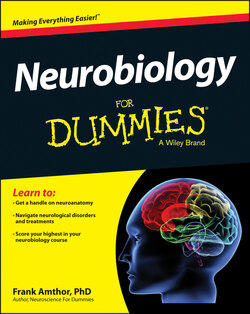Читать книгу Neurobiology For Dummies - Frank Amthor - Страница 37
Language, emotions, lateralization, and thought
ОглавлениеTrue grammatically ordered language distinguishes humans from all other species on earth. Recent evidence has suggested an important role for a gene called FOXP2 in generating language capability, although how this gene changes the brain to allow language isn’t clear.
The human brain does not contain any distinct anatomical structures or types of neurons associated with language. The human brain areas most crucial for language, Wernicke’s and Broca’s areas on the left side (in most humans), have homologous areas in other primates, but these areas do not support language. Yet all normal human infants learn, without any explicit instruction, whatever language to which they are exposed, but other animals do not learn grammatical, word-order based language despite extensive instruction.
The capacity for learning language is built in, but neuroscience does not now know how. One clue may be brain lateralization, however. Left- versus right-side specialization for some types of audio processing and production exists in other mammals, and even some birds, but is nowhere near as extensive as in humans.
A similar association exists with right-hand dominance, driven by the left side of the brain, which is more extensive in humans than any other animal. Chimpanzees, for example, may be relatively right- or left-hand preferring, but most have no overall tendency to be strongly right-handed or left-handed, the way humans do.
Neuroscience’s view of emotions has changed markedly in the last decades. Earlier views regarded emotions as leftovers from our evolution from non-rational species. Star Trek’s Mr. Spock could be taken as a model of a superior, more evolved humanoid. However, we now know that emotions are a means of nonverbal communication within our brains. Hunches and anxiety in certain situations are signs of danger and the need to be cautious.
We see the usefulness of this nonverbal information in people with damage to the orbitofrontal cortex or amygdala. They may gamble recklessly or commit social faux pas because they lack internal feelings about the mistakes they’re making.
